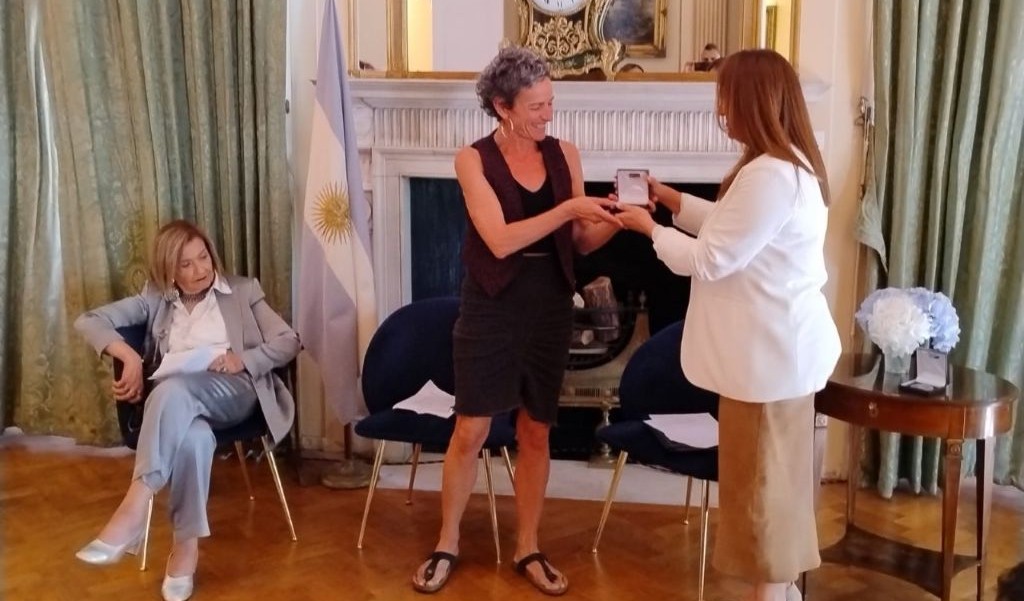Anabel Marín, Research Fellow at IDS and Cluster Leader for Business, Markets and the State, has received the prestigious RAÍCES award from Argentina’s Ministry of Science, Technology and Innovation.

RAÍCES (Network of Argentine Researchers, Scientists and Technologists Abroad) is one of Argentina’s highest recognitions for researchers who have strengthened the country’s science through international collaboration and sustained ties.
Anabel, an expert in development economics with a particular focus on just transitions, resource governance, and inclusive trade, was one of two researchers to win in the Social Sciences and Humanities field.
The RAÍCES award programme recognises just eight Argentine researchers each year through a state-led, peer-reviewed process. The awards honour scholars who have contributed not just to Argentina’s scientific systems but to global knowledge.
In her acceptance speech, Anabel Marín said:
“I am very happy and grateful to receive this award. They say Argentina is a generous country; I believe it is. It has given me a lot: I studied at a public university — there’s much to improve, but also so much to value. After doing my PhD and postdoc abroad, I returned and joined CONICET [Argentina’s National Scientific and Technical Research Council]. It’s an institution that, like so many things in Argentina, has a lot that needs improving, but also so much worth defending. In a world where the global scientific environment has become so competitive and exclusionary that it is literally making researchers ill, having a CONICET — with all its shortcomings — is a luxury. A luxury we have sustained through tremendous collective effort, in a country facing enormous economic, social and political challenges.”
But, she warned:
“My research is about development, and I’m a development economist. I look on with concern as many fundamental ideas that were developed in the global South, like structuralism, have been lost or simply not acknowledged. These ideas precisely focused on that difficult relationship between structure and agency, between constraints and power. In development studies now, by contrast, discussions about power have become almost exclusively micro: there’s talk of decolonisation, but centred on micro, local dynamics, while the big questions — why are some countries poor and others rich, how is unequal exchange reproduced — have been largely sidelined.”
Read Anabel’s latest research report
The RAICES awards programme has honoured 90 Argentinean researchers since its inception in 2003. This year, other recipients include Viviana Zelizer, whose work in sociology has profoundly shaped how we understand economic life, and Carlos Lousto, known for his work on black holes.
About Anabel Marín
Raised and educated in Argentina, Anabel earned her Bachelor’s in Economics from Córdoba University and a Master’s in Industrial Economy and Development from UNGS. She then moved to the UK to pursue a PhD in Science and Technology Policy at SPRU, University of Sussex, supported by ESRC and ORS fellowships. Between 2007 and 2009, she remained at SPRU as an ESRC-funded postdoctoral researcher, deepening her expertise in innovation policy.
After her tenure in the UK, Dr Marín returned to Argentina as a CONICET researcher (2010–2021), supported by national research grants throughout the decade. She led multiple projects funded by IDRC (Canada), the Inter-American Development Bank, the International Social Science Council and others. As part of a project co-directed with colleagues at SPRU and IDS — the Pathways initiative, funded by the International Science Council — she co-founded Bioleft, an open-source seed innovation platform. This work exemplifies her unique combination of activism and rigorous scholarship.
Complementing her academic pursuits, between 2017 and 2018 Anabel was seconded full-time to Argentina’s Directorate of the National Commission of External Trade. She later advised the Minister of Production on mining policy (2019–2020), demonstrating her ability to bridge research, policy and institutional governance. In 2020, she became director of CENIT, the Center for the Transformation of Argentina, at UNSAM.
In 2022, Anabel joined IDS as Research Fellow and Cluster Leader, while officially remaining a CONICET researcher on leave – underscoring her unique position strengthening both Argentine and UK science and policy systems.
At IDS, Dr Marín leads the Business, Markets & State cluster, focusing on sustainable transitions, resource governance, and justice in trade. Flagship projects include an ESRC-funded study on vaccines innovation, work on the justice footprint of mineral imports (linking trade to social justice in the UK), and FCDO-funded research on responsible business practices in low- and middle-income countries. She also contributed to BOLERO (UKRI–Innovate UK), the Covid Collective, and foresight work funded by IDRC involving Argentina, South Africa and beyond.
